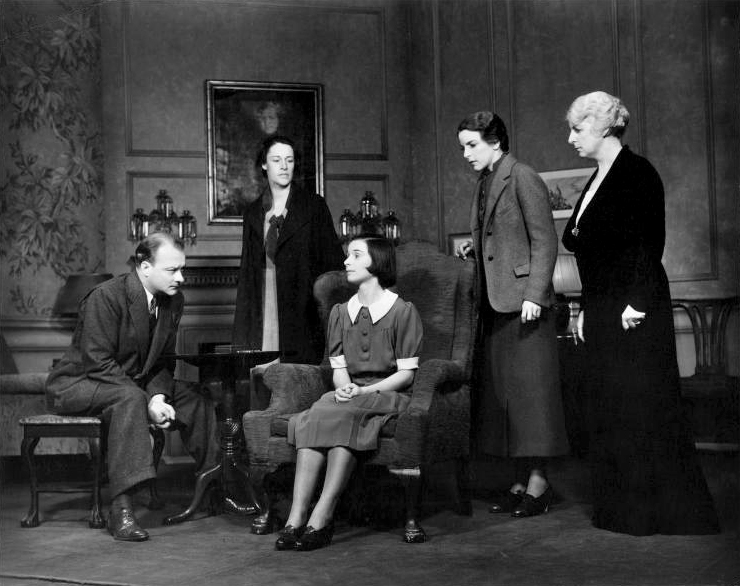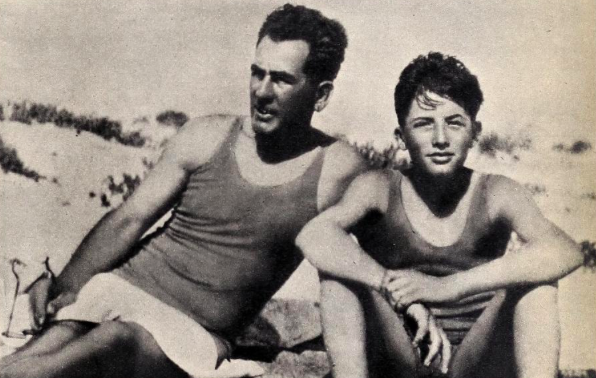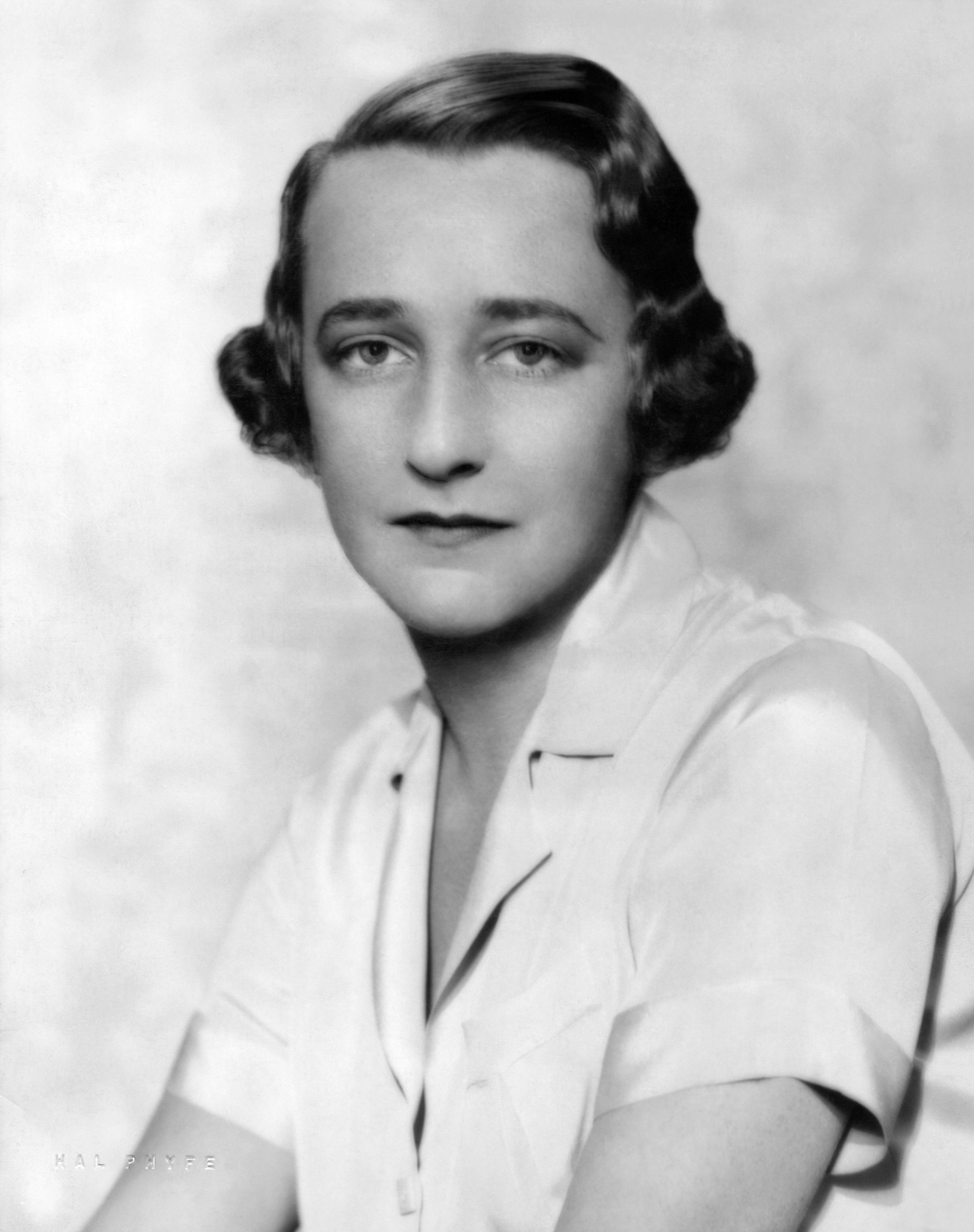|
Anne Revere
Anne Revere (June 25, 1903 – December 18, 1990) was an American actress and a progressive member of the board of the Screen Actors' Guild. She was best known for her work on Broadway theatre, Broadway and her film portrayals of mothers in a series of critically acclaimed films. An outspoken critic of the House Un-American Activities Committee, her name appeared in ''Red Channels, Red Channels: The Report on Communist Influence in Radio and Television'' in 1950 and she was subsequently blacklisted. Revere won an Academy Award for Best Supporting Actress, Academy Award for her supporting role in the film ''National Velvet (film), National Velvet'' (1945). She was also nominated in the same category for ''The Song of Bernadette (film), The Song of Bernadette'' (1943) and ''Gentleman's Agreement'' (1947). She won a Tony Award for Best Featured Actress in a Play, Tony Award for her performance in Lillian Hellman's play ''Toys in the Attic (play), Toys in the Attic'' in 1960. Ea ... [...More Info...] [...Related Items...] OR: [Wikipedia] [Google] [Baidu] |
Locust Valley, New York
Locust Valley is a Hamlet (New York), hamlet and census-designated place (CDP) located in the Oyster Bay (town), New York, Town of Oyster Bay in Nassau County, New York, Nassau County, on the North Shore (Long Island), North Shore of Long Island, in New York (state), New York, United States. The population was 3,406 at the 2010 census. History The rolling hills of the North Shore of Long Island were laid down as terminal moraines by the receding glaciers of the last ice age roughly 10,000 years ago. The Algonquian peoples, Algonquian tribe that settled the area, spanning from Flushing to Setauket, called the area "hilly ground" or Matinecock and as a result the Algonquian Indians who settled there became known as the Lenape, Matinecock Indians. In 1667, Captain John Underhill negotiated with the Matinecock Indians to purchase land for a settlement that he and his fellow colonists would call Buckram.''If You're Thinking Of Living In: Locust Valley'' By Todd Purdum ''The New York ... [...More Info...] [...Related Items...] OR: [Wikipedia] [Google] [Baidu] |
Upper West Side
The Upper West Side (UWS) is a neighborhood in the borough of Manhattan in New York City. It is bounded by Central Park on the east, the Hudson River on the west, West 59th Street to the south, and West 110th Street to the north. The Upper West Side is adjacent to the neighborhoods of Hell's Kitchen to the south, Columbus Circle to the southeast, and Morningside Heights to the north. Like the Upper East Side opposite Central Park, the Upper West Side is an affluent, primarily residential area with many of its residents working in commercial areas of Midtown and Lower Manhattan. Similarly to the Museum Mile district on the Upper East Side, the Upper West Side is considered one of Manhattan's cultural and intellectual hubs, with Columbia University and Barnard College located just to the north of the neighborhood, the American Museum of Natural History located near its center, and Lincoln Center for the Performing Arts and Fiorello H. LaGuardia High School located at the sout ... [...More Info...] [...Related Items...] OR: [Wikipedia] [Google] [Baidu] |
Gregory Peck
Eldred Gregory Peck (April 5, 1916 – June 12, 2003) was an American actor and one of the most popular film stars from the 1940s to the 1970s. In 1999, the American Film Institute named Peck the 12th-greatest male star of Classic Hollywood Cinema. After studying at the Neighborhood Playhouse with Sanford Meisner, Peck began appearing in stage productions, acting in over 50 plays and three Broadway productions. He first gained critical success in ''The Keys of the Kingdom'' (1944), a John M. Stahl–directed drama which earned him his first Academy Award nomination. He starred in a series of successful films, including romantic-drama ''The Valley of Decision'' (1944), Alfred Hitchcock's '' Spellbound'' (1945), and family film ''The Yearling'' (1946). He encountered lukewarm commercial reviews at the end of the 1940s, his performances including ''The Paradine Case'' (1947) and ''The Great Sinner'' (1948). Peck reached global recognition in the 1950s and 1960s, appearing back ... [...More Info...] [...Related Items...] OR: [Wikipedia] [Google] [Baidu] |
Jennifer Jones
Jennifer Jones (born Phylis Lee Isley; March 2, 1919 – December 17, 2009), also known as Jennifer Jones Simon, was an American actress and mental health advocate. Over the course of her career that spanned over five decades, she was nominated for the Oscar five times, including one win for Best Actress, as well as a Golden Globe Award win for Best Actress in a Drama. A native of Tulsa, Oklahoma, Jones worked as a model in her youth before transitioning to acting, appearing in two serial films in 1939. Her third role was a lead part as Bernadette Soubirous in '' The Song of Bernadette'' (1943), which earned her the Academy Award and Golden Globe for Best Actress. She went on to star in several films that garnered her significant critical acclaim and a further three Academy Award nominations in the mid-1940s, including ''Since You Went Away'' (1944), ''Love Letters'' (1945), and '' Duel in the Sun'' (1946). In 1949, Jones married film producer David O. Selznick, and appeared ... [...More Info...] [...Related Items...] OR: [Wikipedia] [Google] [Baidu] |
Elizabeth Taylor
Dame Elizabeth Rosemond Taylor (February 27, 1932 – March 23, 2011) was a British-American actress. She began her career as a child actress in the early 1940s and was one of the most popular stars of classical Hollywood cinema in the 1950s. She then became the world's highest paid movie star in the 1960s, remaining a well-known public figure for the rest of her life. In 1999, the American Film Institute named her the seventh- greatest female screen legend of Classic Hollywood cinema. Born in London to socially prominent American parents, Taylor moved with her family to Los Angeles in 1939. She made her acting debut with a minor role in the Universal Pictures film ''There's One Born Every Minute'' (1942), but the studio ended her contract after a year. She was then signed by Metro-Goldwyn-Mayer and became a popular teen star after appearing in ''National Velvet'' (1944). She transitioned to mature roles in the 1950s, when she starred in the comedy ''Father of the Bride'' (195 ... [...More Info...] [...Related Items...] OR: [Wikipedia] [Google] [Baidu] |
Tony Award For Best Performance By A Featured Actress In A Play
The Tony Award for Best Featured Actress in a Play is an honor presented at the Tony Awards, a ceremony established in 1947 as the Antoinette Perry Awards for Excellence in Theatre, to actresses for quality supporting roles in a Broadway theatre, Broadway play. The awards are named after Antoinette Perry, an American actress who died in 1946. Honors in several categories are presented at the ceremony annually by the Tony Award Productions, a joint venture of The Broadway League and the American Theatre Wing, to "honor the best performances and stage productions of the previous year." Originally called the "Tony Award for Actress, Supporting or Featured (Dramatic)", Patricia Neal first won the award at the 1st Tony Awards, inception of the ceremony for her portrayal of Regina Hubbard in Lillian Hellman's ''Another Part of the Forest''. Before 1956, nominees' names were not made public: the change was made by the awards committee to "have a greater impact on theatregoers". The award ... [...More Info...] [...Related Items...] OR: [Wikipedia] [Google] [Baidu] |
Three Sisters (play)
''Three Sisters'' (russian: Три сeстры́, translit=Tri sestry) is a play by the Russian author and playwright Anton Chekhov. It was written in 1900 and first performed in 1901 at the Moscow Art Theatre. The play is sometimes included on the short list of Chekhov's outstanding plays, along with ''The Cherry Orchard'', ''The Seagull'' and ''Uncle Vanya''. Characters The Prozorovs * Olga Sergeyevna Prozorova (Olga) – The eldest of the three sisters, she is the matriarchal figure of the Prozorov family, though at the beginning of the play she is only 28 years old. Olga is a teacher at the high school, where she frequently fills in for the headmistress whenever the latter is absent. Olga is a spinster and at one point tells Irina that she would have married "any man, even an old man if he had asked" her. Olga is very motherly even to the elderly servants, keeping on the elderly nurse/retainer Anfisa, long after she has ceased to be useful. When Olga reluctantly takes the ... [...More Info...] [...Related Items...] OR: [Wikipedia] [Google] [Baidu] |
As You Like It
''As You Like It'' is a pastoral comedy by William Shakespeare believed to have been written in 1599 and first published in the First Folio in 1623. The play's first performance is uncertain, though a performance at Wilton House in 1603 has been suggested as a possibility. ''As You Like It'' follows its heroine Rosalind as she flees persecution in her uncle's court, accompanied by her cousin Celia to find safety and, eventually, love, in the Forest of Arden. In the forest, they encounter a variety of memorable characters, notably the melancholy traveller Jaques, who speaks many of Shakespeare's most famous speeches (such as "All the world's a stage", "too much of a good thing" and "A fool! A fool! I met a fool in the forest"). Jaques provides a sharp contrast to the other characters in the play, always observing and disputing the hardships of life in the country. Historically, critical response has varied, with some critics finding the play a work of great merit and some f ... [...More Info...] [...Related Items...] OR: [Wikipedia] [Google] [Baidu] |
The Children's Hour (play)
''The Children's Hour'' is a 1934 American play by Lillian Hellman. It is a drama set in an all-girls boarding school run by two women, Karen Wright and Martha Dobie. An angry student, Mary Tilford, runs away from the school and, to avoid being sent back, tells her grandmother that the two headmistresses are having a lesbian affair. The accusation proceeds to destroy the women's careers, relationships, and lives. The play was first staged on Broadway at the Maxine Elliott Theatre in 1934, produced and directed by Herman Shumlin. In 1936, it was presented in Paris and at London's Gate Theatre Studio. Synopsis Two women, Karen Wright and Martha Dobie, have worked hard to build a girls' boarding school in a refurbished farmhouse. They run and teach the school with the somewhat unwelcome help of Lily Mortar, Martha's aunt. One pupil, Mary Tilford, is mischievous, disobedient, and untruthful, and often leads the other girls into trouble. One day, when Mary feigns illness and is b ... [...More Info...] [...Related Items...] OR: [Wikipedia] [Google] [Baidu] |
Repertory Theatre
A repertory theatre is a theatre in which a resident company presents works from a specified repertoire, usually in alternation or rotation. United Kingdom Annie Horniman founded the first modern repertory theatre in Manchester after withdrawing her support from the Abbey Theatre in Dublin. Horniman's Gaiety Theatre, Manchester, Gaiety Theatre opened its first season in September of 1908. The opening of the Gaiety was followed by the Citizens' Theatre in Glasgow and the Liverpool Repertory Theatre. Previously, regional theatre relied on mostly London touring ensembles. During the time the theatre was being run by Annie Horniman, a wide variety of types of plays were produced. Horniman encouraged local writers who became known as the Manchester School (writers), Manchester School of playwrights. They included Allan Monkhouse, Harold Brighouse, writer of ''Hobson's Choice (play), Hobson's Choice'', and William Stanley Houghton, Stanley Houghton, who wrote ''Hindle Wakes (play), Hind ... [...More Info...] [...Related Items...] OR: [Wikipedia] [Google] [Baidu] |
Richard Boleslavsky
Richard Boleslawski (born Bolesław Ryszard Srzednicki; February 4, 1889 – January 17, 1937) was a Polish theatre and film director, actor and teacher of acting. Biography Richard Boleslawski was born Bolesław Ryszard Srzednicki on February 4, 1889, in Mohyliv-Podilskyi, in the Russian Empire to an ethnic Polish family of Catholic faith. He graduated from the Tver Cavalry Officers School. He trained as an actor at the First Studio of the Moscow Art Theatre under Konstantin Stanislavski and his assistant Leopold Sulerzhitsky, where he was introduced to the 'system'. During World War I, Boleslawski fought as a cavalry lieutenant on the tsarist Russian side until the fall of the Russian Empire. He left Russia after the October Revolution of 1917 for his native Poland, where he directed his first movies. As his birth name was difficult to pronounce, he took the name Ryszard Bolesławski. His ''Miracle at the Vistula'' (''Cud nad Wisłą'') was a semi-documentary about the mirac ... [...More Info...] [...Related Items...] OR: [Wikipedia] [Google] [Baidu] |




_1.jpg)




.jpg)